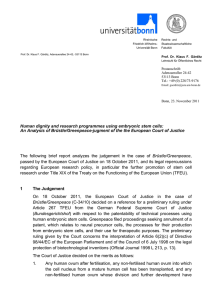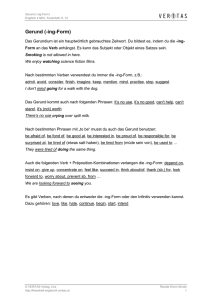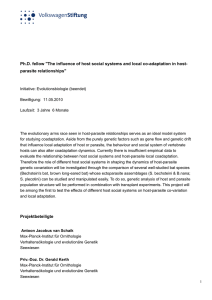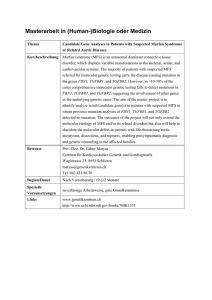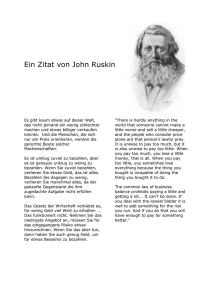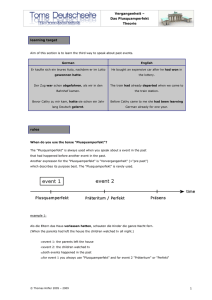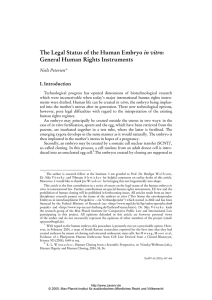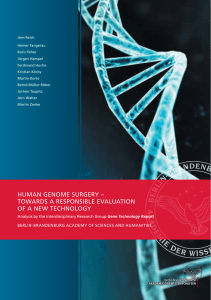Gene Technology The Impact on the Human
Werbung
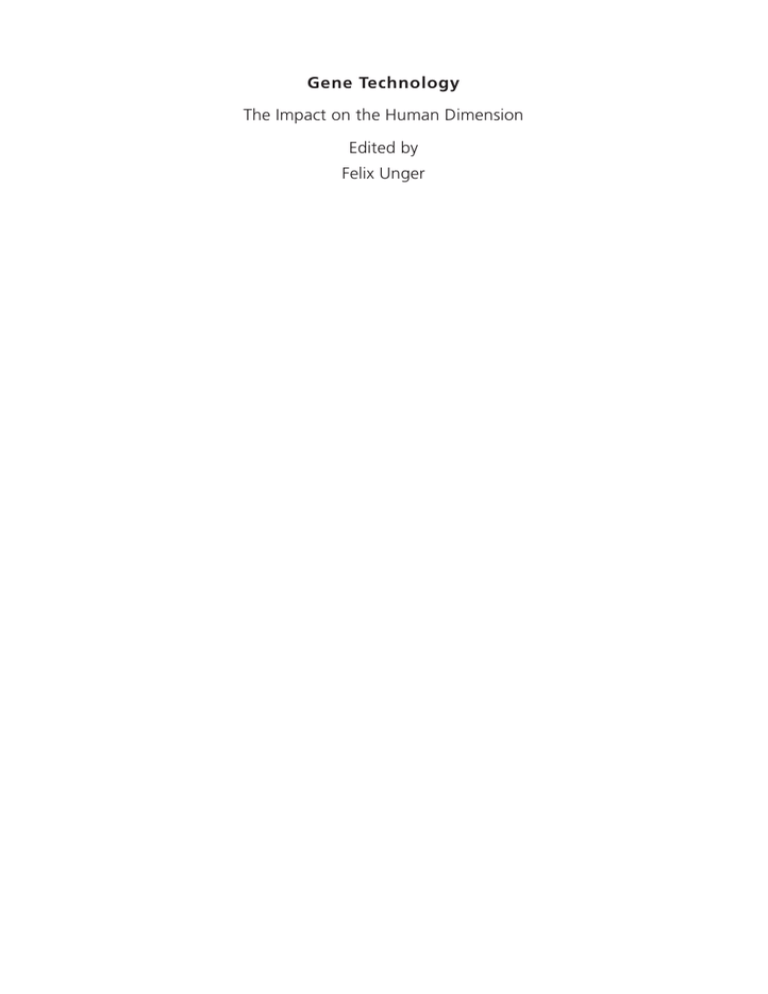
Gene Technology The Impact on the Human Dimension Edited by Felix Unger edition weimar European Academy of Sciences and Arts Edited by Ludwig Tavernier and Felix Unger Scientific Board Gilbert Fayl, Maximilian Fussl, José Luis Garcia Garrido, Nikolaus Lobkowicz, György Pethes, Francisco José Rubia Vila, Raoul A. Weiler Eugen Biser, Josef Bugl, Erich Hödl, Norbert Höslinger, Konrad Meßmer, Erwin Möde, Peter Koslowski, Edgar Morscher, Justin Stagl, Raphael Vara Thorbeck, Peter A. Wilderer, Karl Matthias Woschitz The European Academy of Sciences and Arts is supported by the Republic of Austria and the European Union Felix Unger (Ed.) Gene Technology The Impact on the Human Dimension edition weimar 2004 edition weimar European Academy of Sciences and Arts Edited by Ludwig Tavernier and Felix Unger Volume 3 Felix Unger (Hg.) Gene Technology The Impact on the Human Dimension Responsible for the contents are the authors of the contributions. Verantwortlich für den Inhalt sind die Verfasser der Beiträge. © VDG ■ Verlag und Datenbank für Geisteswissenschaften ■ Weimar 2004 All rights reserved. No part of this publication may be translated, reproduced, stored in a retrieval system, or transmitted in any form or by any means, electronic, mechanical, photocopying, recording or otherwise, without the prior permission of the publisher. Reihengestaltung: Katharina Hertel, Weimar Druck: VDG ISBN 3-89739-382-4 Inhaltsverzeichnis GEBHARD FÜRST Introduction 9 OTFRIED HÖFFE Die Moral als Preis der neuzeitlichen Forschung 13 DIETRICH VON ENGELHARDT Medicine between Technology and Humanity Concepts of Disease, Therapy and Physician-Patient Relationship in the Historical Perspective Introduction Antiquity Middle Ages Modern Times Perspectives Literature 24 24 26 28 30 33 35 WERNER ARBER Roots, Potential and Conjectural Risks of Gene Technology* Abstract Introduction Background knowledge Major components of gene technology Research strategies of classical genetics and of molecular genetics differences The impact of genetic engineering on biotechnology Conjectural risks of genetically modified organisms Bacterial genetics reveals the process of molecular evolution at work Products of evolution genes together with nongenetic elements generate spontaneous genetic variations Conclusions and outlook References 36 36 36 37 38 39 41 42 43 46 47 50 FRANK GLEESON Recent Techniques in Analyzing Genomes 51 THOMAS R. WEIHRAUCH Impact of Pharmacogenetics on Health Care and Health Economics Abstract 1. SHORT VERSION Key stakeholders 2. LONG VERSION Underlying assumptions and drivers Increased demands on health care Increased demands of the patient Finite health care resources Opportunities For the patient For the physician For economic benefit For the health care industry Predictive medicine Challenges, issues and future impact Health care policy Societal and ethical considerations Implementation Communication and education Conclusion and outlook 60 60 61 62 62 63 63 64 64 64 65 65 66 66 68 68 68 69 70 70 72 J. C. HUBER Stehen die Biowissenschaften vor einer kopernikanischen Wende? 73 DAVID C. RUBINSZTEIN The Genetics of Alzheimer’s Disease-Perspectives and Promises Introduction Genes causing early-onset Adapp Presenilin genes Apo E and Ad Conclusions Acknowledgenents References 80 80 81 82 83 86 86 87 SAVIO L.C. WOO Gene Therapy: The use of Genes as Medicine References 91 98 RUTH DEECH The Regulation of Therapeutic Cloning and Preimplantation Genetic Diagnosis in the U.K. 100 HORST SEIDL Anthropologische und ethische Überlegungen zur Gentechnologie Methodologische, interdisziplinäre Vorbemerkung, anthropologische Grundlagen Die biologischen Tatsachen der embryonalen Genese in naturphilosophischer und anthropologischer Perspektive Zur ethischen Beurteilung gentechnologischer Eingriffe in den Embryo Abschließende Bemerkung über das rechte Verhältnis des Menschen zur Natur 110 112 116 117 121 K. DIERICKX, H. NYS, I. DREEZEN, C. TROUET Informed Consent to take, Preserve and Use DNA Samples for Research Introduction Part I: Information which precedes the consent to take, preserve and use biological samples for quality assessment/research. The sample Supply to third parties of cell lines created by using your sample Examples Protection of your identity and privacy Inventions, patents and commercial applications Part II Consent form to take, preserve and use tissue samples for quality assessment /research 124 124 125 125 126 126 127 128 129 EUGEN BISER Human Dignity in Context with our Cultures Die Fehlsteuerung Die Überforderung Das utopische Zeitalter Der Rückbezug Das Zeitgeschehen Die Kompetenz Die Berechtigung Schlussbemerkung 131 131 131 132 133 135 137 138 140 EDGAR MORSCHER Does Gene Technology Endanger the Autonomy of Human Beings? 142 BEAT SITTER-LIVER Responsibility in Gene Technology: The Impact of Human Finitude The need for common goals and some difficulties tied to it The importance of the hermeneutical approach in biomedical ethics Finitude: a repressed condition of human existence Authenticity in gene technology Finitude and moral responsibility Conclusion 148 148 149 151 153 156 159 GÜNTER VIRT Die Spaltung des Menschlichen im Horizont der modernen Lebenswissenschaften Ethische Vorbemerkungen Das jüdisch-christliche Menschenbild Methodischer Frageraster, Das reduktionistische Menschenbild 160 161 163 165 168 HEINZ SCHOTT Alchemie versus Gentechnologie: Ärztliche Ethik bei Paracelsus und ihre Aktualität 1. Dimension: Das göttliche Gebot 2. Dimension: Die ärztliche Kunst 3. Dimension: Die Heilkraft des Arztes Ausblick auf Gentechnologie und Bioethik heute Literatur 174 175 176 177 179 182 FRANZ CARDINAL KÖNIG Die Erschaffung des Menschen 183 Introduction GEBHARD FÜRST Thank you for your kind invitation to open this workshop. I should like to express my pleasure that as an institution, the European Academy of Sciences and Arts, which represents and brings together outstanding scientists and academics, has chosen this key topic for discussion. Within your own scientific fields, many of you deal with current bio-ethical questions whether from the perspective of natural sciences or the arts. This is also a signal to the public that will not be overlooked. Many of you are directly involved in the challenges and come face to face with the dilemmas posed by the new discoveries and technology, whether as doctors, researchers, politicians, moral philosophers or jurists. You bear responsibility, but responsibility needs standards and orientation. Therefore, it is important that we enter into a dialog about the bio-ethical questions. Current developments in genetic engineering and bio-medicine are resulting in profound changes to culture and civilization. Never before have we known so much, never before have we been able to achieve what we can achieve today. But do we want to know everything that we can know? And should we do everything we can do, just because we can? I represent the Catholic German Conference of Bishops on the recently founded National Council for Ethics, which aims to reflect the ethical questions and arguments in connection with life sciences. The Church, ladies and gentlemen, must assert its convictions about man and his dignity, about the right social, economic and state order in society’s discourse. It considers itself an advocate of humanity and the inviolability of man. Today, this aspect of inviolability that actually distinguishes human beings is threatened by secondary aims, an issue that has been highlighted several 9 times by the Catholic Church, most recently in Germany in the paper entitled “Man his own creator?” and by the Central Committee of German Catholics. Does man not collapse under the contradiction that he plays God over life and death of his fellow human beings and at the same time thinks so poorly of himself that he regards human life only as biological material to be exploited? Especially where ethical questions are concerned, the Church represents not only a large group of society but an ethical competence which has developed over many centuries in discussion with the most diverse cultures and is ultimately the modern basis of morality. In terms of the current bioethical questions, transnational standards and orientation are needed, to which the Church will make its contributions, because of its history and its belief in itself as worldwide, universal Church. The Church supports genetic engineering and bio-medicine where it respects and fosters the dignity of man; but the Church must highlight the risks and consequences. The basis of Christian ethics is the dignity of the human being that stems from being created in God’s own image. This human dignity is enshrined in the German Basic Law, the jurisdiction of the Federal Constitutional Court and the constitutions of most European countries. Every human being has the right to absolute human dignity, inviolable by other human beings or by the state. Human dignity can neither be earned nor lost. It cannot be made dependent on performance, happiness, social tolerance or similar assessed by a third party. It is just as absurd at the basic level as it is arbitrary at the concrete level to tie human dignity and the entitlement to protection under the law to a person’s performance. I cannot convince anybody to respect my dignity, if that person does not respect my dignity by simply taking me seriously as the other person in a discussion. When human life is in the position of having to justify its existence, we are on a slippery slope, not just at the beginning but also at the end of life. Human dignity and the human condition are indivisible because the development of man and the condition of being human are a continuous organic process from the fusion of the ovum and sperm cell, through embryonic life and birth, through childhood and 10 adulthood to illness, dying and death. Neither science nor anthropology provide an authentic, evidence-based turning point in human development that is independent of any value judgment. The church is not defending a nostalgic idea of life but one of the moral basic principles of the Enlightenment. It is concerned that these principles have become irrelevant and dispensable in favor of economic profit, in the modern and ostensibly enlightened societies. Secondly, the principle of human dignity means that man must be the aim and purpose of all social and scientific developments, but must never be used as the means to that end. Whatever experiments are carried out in the name of science and technology, especially in medicine and pharmacology, must be proven to serve the well-being of mankind and successive generations. Evidence must be provided as to why research and application should be carried out, not as to why it should not be done or on the basis that it might be useful and might not cause harm. In this point, the current discussion is suffering from broken promises of happiness and fantasies of salvation as well as from the complete uncertainty of short and long-term consequences of this new technology. Just as “therapeutic cloning” has nothing to do with therapy but with cultivation of human biological material, the pre-implantation diagnosis has less to do with helping childless couples but more to do with avoiding sick and handicapped children. It is a paradox when research and technology that wants to serve man consumes human life. Research, enabled by a loophole in the law, with imported stem cells is only the first step towards destroying the laws that protect embryos. In fact, genetic engineering, just as nuclear energy in its time, has caused more problems than it has solved. Thirdly, it is part of absolute human dignity that human life must be taken seriously in terms of its moral character. In other words, just as the individual has the right not only to be a product of genetic engineering but also to be a child of his parents, so conversely parenthood is not only concerned with producing a descendant of as high a genetic quality as possible but is an 11 expression of a moral and social relationship. Human beings are reproduced and not created. Children are not goods where you can claim for damages when they are faulty. It is a cruel imposition on a man to have to live with the awareness that he was chosen because of certain promising genetic aptitudes for life and having to develop appropriately. Mr. President, ladies and gentlemen, what I have just presented are the central points in the ethical orientation of questions of bio-medical research and application. Let me in conclusion point out one more issue from my experiences in the political discourse as it has been held up to now. We are all called upon to form a responsible opinion about these crucial bio-ethical questions, each and every citizen, but especially scientists, academics, and those who bear the responsibility for our community and for our culture, particularly political and legal culture in Europe. In the past, the Catholic Church has demanded a wider, more transparent, and greater public debate of these issues. In the meantime, such a discussion has started and we, I, welcome that. However, there is another important point. Ethics cannot be delegated to scientific ethics centers or to national ethics councils or ethical committees in hospitals or anywhere else. Responsibility cannot be represented in this way. Ethical councils will certainly not simply give a green or red light to certain problems, as some politicians have intended. An ethical council does not function like traffic lights where you have to stop at the red light and move forward on green, and race across quickly when its yellow. What it is about though, is collecting all the important information, facts and ethical and moral arguments in order to enable those with responsibility to form an autonomous and proper opinion. This workshop will surely play an important part. Ladies and gentlemen, Mr President, I wish you much success. 12
